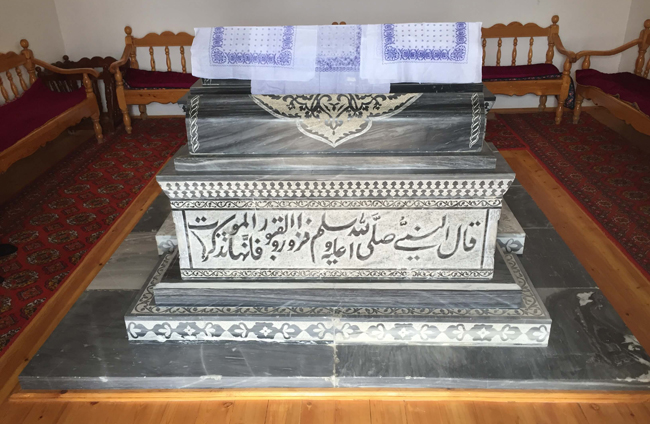-

 Know, the true nature of your Beloved.
Know, the true nature of your Beloved.
In His loving eyes, your every thought,
Word and movement is always –
Always Beautiful.
~ Hafiz
The Golden Chain

14. Khwaja Ali Ramitani al-Azizan
Khwaja Ali Ramitani al-Azizan (may God sanctify his innermost being) is the fourteenth Shaykh in the Naqshbandi Golden Chain, whilst also being the fifth Khwaja in the ‘Khwajagan’ – the Masters of Wisdom of Central Asia.
He was born in the village of Ramitan, near Bukhara in Uzbekisatan. From a young age, he was an avid student of the knowledge of the Divine Law, the Traditions and the Quran. By the time he met Khwaja Mahmud Ingir al-Fagnevi, from whom he was given the Naqshbandi spiritual secret, he was a reference for anyone seeking religious or legal direction.
He was a weaver of carpets by trade and would give away more than half of his earnings to the poor. As recorded by Mawlana Abdul Rahman Jami in his famous book entitled ‘Nafahat al-Uns’ (Breaths of Divine Intimacy), Mevlana Jalaluddin Rumi referred to Khwaja Ali as ‘Khwaja Nassaj’ (the Weaver) in his poem:-
‘If there is anyone whose knowledge of the spiritual state
is beyond description in words,
he must surely be Khwaja Nassaj (the Weaver),
the servant of the people of high rank of Bukhara!’
He was known by two nicknames – ‘Khwaja Azizan’, meaning ‘Mighty and Sacred Master’, because he was the highest cardinal Saint (‘Qutb’) of his time, and ‘Pir Nessaj’, meaning ‘Shaykh of the Weavers’.
He was endowed with high spiritual qualities and remarkable charismatic powers. Many miracles are attributed to him, including curing people that were close to death. In speech he displayed a sharp and independent intelligence, with a manner of open disposition.
He was largely responsible for one of the most important events in history: the conversion of the Mongol Khans to Islam. He met Genghis Khan through his Master, Khwaja Mahmud, at about thirty years of age. Khwaja Ali travelled widely throughout Turkestan and Khurasan and was consulted by the Mongol Khans appointed by Mongke. Mongke was eventually so impressed by Khwaja Ali, that the Mongols adopted Islam as their religion. The Khwajagan also took an active role in organizing the work of reconstruction required after the Mongol destruction, whilst not getting involved in the political or religious quarrels of the time. Despite his influence with the ruling classes, he continued to support his family with his work as a weaver and to live in his humble dwelling.
Upon receiving a Divine command, Khwaja Ali moved from Bukhara to Khwarazm. When he reached Khwarazm, he did not enter the city, but stayed at its gate and sent a messenger to the King to tell him, “A poor weaver has come to enter and stay in your kingdom. Do you give permission, or not? If you give permission, I will enter. If not, I will go back.” He asked the messenger to obtain a letter, signed by the King, granting this permission.
When he received this letter, the Shaykh entered the city and began to spread the Naqshbandi way. Every day he went to the city centre, speaking with the people, asking them to come to his gatherings and for some, paying their wages for the day. All the inhabitants of the city became his followers, pious worshippers and dedicated keepers of remembrance. He became very famous, with people travelling from every direction to visit him.
The King and his ministers became afraid of the influence that Khwaja Ali had over the people of Khwarazm and began to remove him from the city.
Having foreseen this event, Khwaja Ali sent the letter back to the King. On receiving the letter, the King came to the Khwaja and apologized, asking for forgiveness. He became one of Khwaja Ali’s foremost disciples. Due to his influence in Bukhara, he was able to teach openly to people of all social classes, throughout the city.
Khwaja Ali was a contemporary of Khwaja Ahmad Yasavi, the great deputy of Khwaja Yusef al-Hamadani and when they met from time to time, they would have heart to heart conversations.
He had two sons, Khwaja Khurd and Ibrahim, who was famous for following in the footsteps of his father. He did not pass the Naqshbandi secret to them, but to his foremost Deputy, Khwaja Muhammad Baba as-Samasi. He left three other deputies, Khwaja Muhammad Kulahduz, Khwaja Muhammad Hallaj Balkhi and Khwaja Muhammad Bawardi.
Khwaja Ali died in 1321 AD, at the age of 130 years and was buried in Alamdor, 20kms north west of Bukhara.
May God be well pleased with him.
Sources:- ‘The Naqshbandi Way – History and Guidebook of the Saints of the Golden Chain’ by Mawlana Shaykh Hisham.
‘Rashahat Ain al-Hayat – Beads of Dew from the Source of Life. Histories of the Khwajagan The Masters of Wisdom’ by Mawlana Ali ibn Husain Safi.
‘Masters of Wisdom of Central Asia’ by Hasan Shushud.
‘The Masters of Wisdom’ by John G. Bennett.
